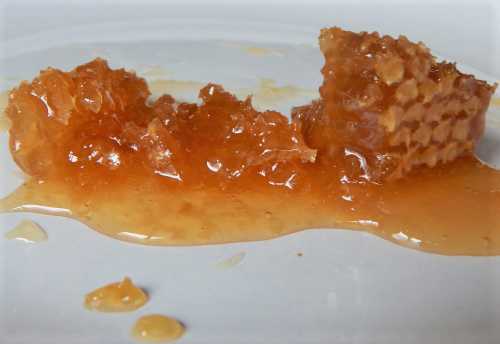Is Propolis Good For You?
Propolis (and other hive products) has been used as a medicine by humans for many hundreds of years.
There have been a great man scientific studies carried out to find out whether propolis is a good treatment for illnesses of the human respiratory system, such as sore throat, infections and even cancer.
Is Propolis Good For You?
Honey bees use propolis to protect their colonies. It is used for plugging gaps in hives, and preventing the spread of infection and bacteria. See: What is bee propolis?
But given the anti-microbial benefits of propolis in a honey bee nest or hive, can any health benefits be transferred to humans?
Potential health benefits of propolis
A systematic review of 158 studies concerning propolis was carried out and published by Felix Zulhendri et al1in February 2022.
Based on
the studies they reviewed they have concluded that propolis is an effective
treatment (either as a primary treatment or as an additional treatment) in respiratory tract illnesses.
They also suggest possible biochemical mechanisms for the clinical
effects of propolis.
Zulhendri and his team concluded the following:
Propolis and upper respiratory tract infections
Propolis
is effective in the treatment of upper respiratory tract infections such as
influenza and the common cold. There are
many studies that show that propolis has activity against the viruses and
bacteria that cause these infections.
Additionally, there are clinical studies that show that propolis can
reduce the symptoms of upper respiratory infections.
For example, Cohen et al2 showed
that a mixture of propolis, echinacea and vitamin C led to a 50% reduction in
episodes of respiratory infections such as tonsillitis, as well as in the number
of days with fever. Read more: Is Propolis Good For Sore Throat?
Propolis and cancer
Propolis
has been shown by a number of studies to have some beneficial activity against
lung cancer cells, although these have all been in vitro studies, and
predominantly against mice lung cancer cells. It would be very important, therefore to conduct trials in humans to determine efficacy, and to understand its potential role (if any) in a clinical setting.
Propolis as an anti-inflammatory
Propolis
has been shown to have anti-inflammatory and activity against fibrosis-type
injury in the lungs. Here again,
however, the work has been done in vitro ("test tube") and in animal models.
Anti-inflammatory effects were also observed in cigarette-smoke damaged lungs, but as above, this work has been carried out in vitro and in animal models.
Propolis and allergic rhinitis (hay fever)
Many
studies show that propolis has a significant effect in improving or mediating
the body processes that lead to asthma and allergic rhinitis (hay fever).
Although a number of these studies have been carried out in vitro and
using animal models, there are also enough clinical studies in patients to
suggest clinical usefulness. Khayyal et
al3, for example demonstrated a significant reduction in the number
and severity of night-time asthma.
Bee propolis side effects
According to the study, there seem to be very few adverse effects of use of propolis, with contact allergy being the main adverse effect.
However, a few serious effects have been recorded. For example, long term aspiration of liquid propolis was believed to have contributed to a tumour-like growth in the lungs of one patient. A case of aspiration pneumonia and descending mediastinitis in a middle-aged woman, was believed to have been induced by a solution of propolis used in the treatment of allergies
Conclusion
Experimental evidence appears to overwhelmingly support the use and development of propolis in treating respiratory tract-related diseases and disorders.
However, the vast majority of the scientific studies reviewed by Zulhendri et al were in animal models or in vitro studies. However, results from studies done in rats or mice, may not be the same when the same study is carried out in human subjects. Therefore, in those scenarios, it seems that more clinical studies in human patients would be required to be confidant of clinical effectiveness of propolis in people.
References
1. Zulhendri F et al Biomedicine & Pharmacotherapy; Volume 146, February 2022, 112595 https://doi.org/10.1016/j.biopha.2021.112595
2. H.A. Cohen, I. Varsano, E. Kahan, E.M. Sarrell, Y. Uziel Effectiveness of an Herbal Preparation Containing Echinacea, Propolis, and Vitamin C in Preventing Respiratory Tract Infections in Children: A Randomized, Double-blind, Placebo-Controlled, Multicenter Study Arch. Pediatr. Adolesc. Med., 158 (2004), pp. 217-221, 10.1001/archpedi.158.3.217
3. M.T. Khayyal, M.A. El-Ghazaly, A.S. El-Khatib, A.M. Hatem, P.J.F. De Vries, S. El-Shafei, M.M. Khattab A clinical pharmacological study of the potential beneficial effects of a propolis food product as an adjuvant in asthmatic patients Fundam. Clin. Pharmacol., 17 (2003), pp. 93-102, 10.1046/j.1472-8206.2003.00117.x
Did You Know?
Toxic Honey Was Used In Ancient Warfare!

If you found this page helpful or interesting, I'd really be grateful if you would share it with others - if not this page, perhaps another, such as Gardening For Bees.
Thank you so much :) .
